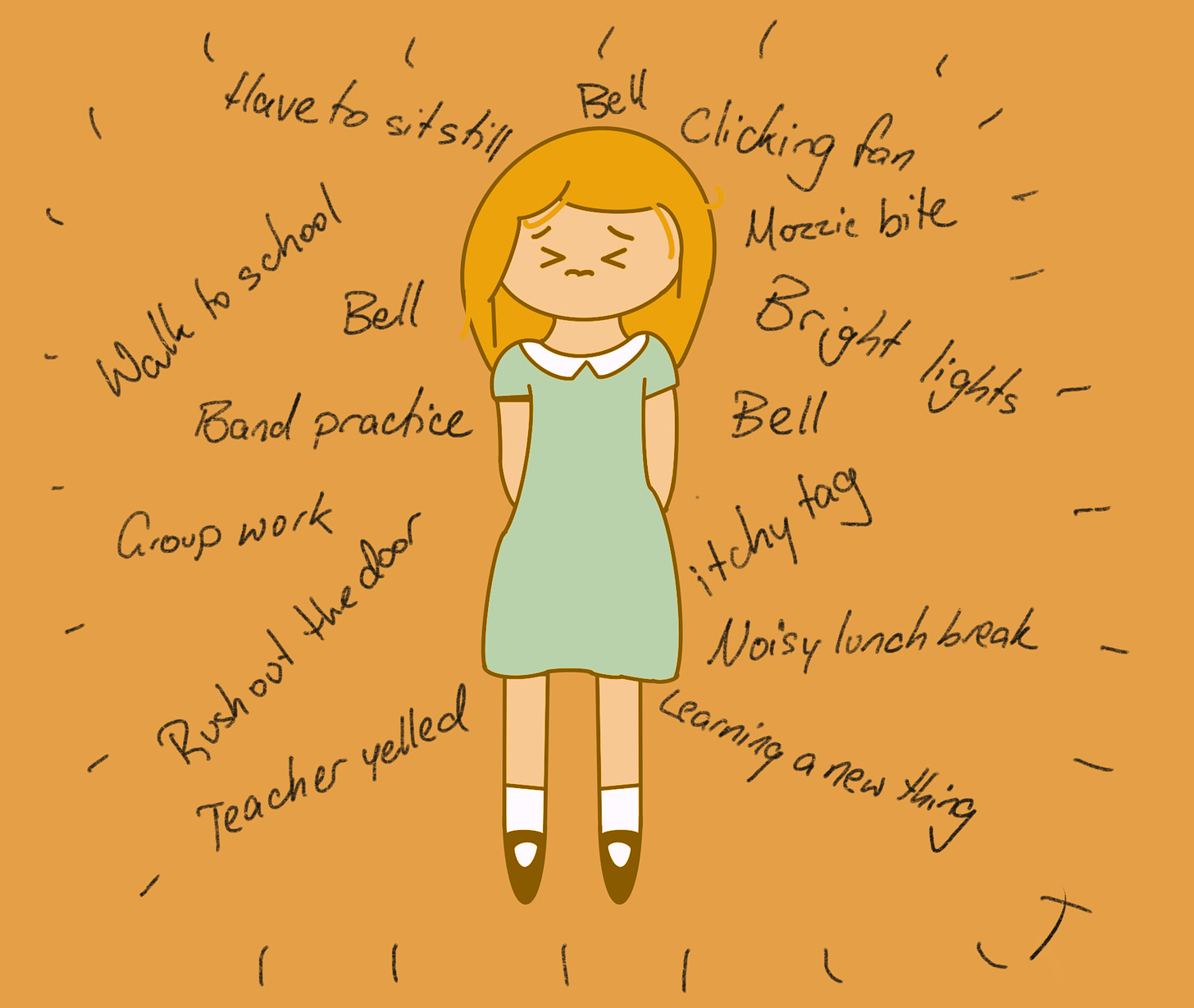Have you ever experienced profound exhaustion? Families with neurodivergent members might frequently encounter the depths of true fatigue, whether in the parents or the children. For some, their experience of the world is so exhausting that they find themselves collapsing from exhaustion most days, or even multiple times a day.
Spoon Theory
In this post, we’ll explore Spoon Theory, a system of energy accounting[1] that can have a significant impact on the lives of exhausted neurodivergent people and those who support them. It’s certainly been very useful in our family.
Spoon Theory imagines that each of us has a metaphorical drawer of spoons, with each spoon representing a portion of our energy reserves. Neurodivergent people frequently start their day with fewer spoons than neurotypical people and tend to expend them more quickly. Importantly, spoons can be added through activities that replenish their energy.
Jamie Knight, an autistic web developer and BBC presenter, explains how he uses Spoon Theory, “even if I sleep really well, I only get ten spoons a day. Things like crossing the road might take half a spoon, certainly getting here [to the BBC studios] this morning took three spoons. So I need to very carefully manage that budget. It’s a bit like misspending by a pound when you’ve got ten pounds versus misspending by a pound when you’ve got one hundred pounds.”[2]
As a parent, Spoon Theory has been very useful as I support my neurodivergent children. It has helped me to identify what uses up spoons throughout the day for my children and assess whether there could be adaptations that mean they use up fewer spoons in the day. Some things that use spoons need to remain in their day. Other things can easily be removed or modified. Our home is an adapted environment, there are many things we have tweaked so those in our family with few spoons aren’t wasting them. This is a God-given opportunity to love one another in an other-person centred way, as Jesus does (John 13:34). We’ll delve deeper into adaptive environments in a post to come.
Home is one thing but asking things outside the home to adapt can sometimes be more difficult. Have you found the same?
There is no doubt that society is designed around neurotypical traits and preferences. For example, why are classroom lights as bright as they are? Why are children told to sit still to listen? Why is the workday typically 8 hours long? Environments and structures in school, church, shops, and workplaces are considered fine because they’re fine for most people.
It’s helpful to remember that neurotypical people aren’t without their own limits. For example, the classroom lights couldn’t be replaced with sports field lights. Children are never asked to sit still for 5 hours straight and listen. The work day isn’t 15 hours long. Perhaps it would be desirable for a child to sit and listen for 5 hours or for an adult to work for 15 hours, but it’s not within their limits, so it’s not even considered a loss. Society has naturally designed itself around the limits of neurotypical people.
And then society forgets those limits exist.
So when a neurodivergent person experiences differences in limits, sometimes society refuses to make allowances. People have forgotten that their own needs have been met, and instead think they have no needs. The neurodivergent person is often left to manage or mask their different needs, moving through an environment and situations that drain them of spoon after spoon.
What is it like?
I’ve asked some neurodivergent children and adults to share how they experience the exhaustion that comes with running out of spoons.
An 11 year old autistic girl tells me, “It feels like everything just gets heavy. I feel like everything is too much all of a sudden. Sometimes I can’t eat. It feels like I’m really sick.”
A 9 year old autistic girl explains, “I feel tired and miserable, I feel like doing nothing, I can only watch my iPad and lie down all day”
An ADHDer in his 40s says, “I feel irritable, like I have a shorter fuse than I am normally capable of. I can’t think clearly and see things objectively. And I get really farty and bloated emotionally.”
An ADHDer in her 30s describes her experience, “I usually notice the mental exhaustion when I want to curl into a ball. I feel heavy, slow, sad and down and it’s really hard to make decisions and to parent well. I want to be alone, under a weighted blanket with music on that helps me cry. A good sleep goes a long way too.”
Adding spoons to add energy
One of my neurodivergent children bemoans the structure of the Australian school day. We spent 9 years living in France, until we returned to Australia 18 months ago. One thing we loved about France was that school children had the option to return home during the 2-hour lunch break. Our children chose that every day. It meant their spoons could be replenished. Familiar food, silence, dim lights, an energy replenishing activity, then back to school. Still, the school day ran from 8:20am-4:30 and so they would often end the day with only enough spoons to make the trip home.
Professor Tony Attwood, an expert in Autism Studies, reminds us of the importance of replenishing spoons.[3] He suggests keeping track of the cost of certain activities and environments and keeping track of the deposits gained from other activities. What invigorates you or your child? What relaxes them? What excites them? What gives them connection?
Many children can identify for themselves some of the things they enjoy. Perhaps it’s holding a pet, playing with toys, engaging in their special interest. There may be more things you can add to their repertoire. Many neurodivergent children find vestibular stimulation very soothing. These are movements that effect the vestibular system in the inner ear, such as jumping, rocking, or swinging. Our trampoline and balance board are invaluable for this! Pressure stimulation also can be relaxing for some. A tight cuddle, a weighted blanket, pressure vests, body socks, a gentle but firm massage, or squeezing objects like a teddy or a stress ball. A variety of positive input is the most effective way to replenish the spoons.
Jesus and the real solution
God did not create humans to have no limits. He does not ask us to do super-human things. Those of us who can see our limitations more clearly can perhaps more easily see what Christ has done for us. As Christians, we must remember what we truly want for our children (hint: it’s not to be like everyone else).
We point them to Christ, who originally had no human limits, but gave that up to serve us as a limited human (Phil 2:7). He needed to eat. He needed to drink. He needed solace. He needed sleep. He knows our limitedness (Heb 4:15). It wasn’t human limits that we needed to be saved from, and we don’t need to wish them away for us or for our children.
It was sin that was the problem. No matter our brain types, this is the real problem. And our loving God solved that problem for us in Jesus’ death and resurrection. As we struggle through this world, we can look to God who has given us freedom from our deepest problem.
Everyone has limits, no matter their neurotype. As a family, we have the privilege of caring for each other as we manage our spoon withdrawals and deposits, not bemoaning our limits but looking to our Lord for our deepest needs.
Isaiah 40:30-31 says "Even youths grow tired and weary, and young men stumble and fall; but those who hope in the Lord will renew their strength. They will soar on wings like eagles; they will run and not grow weary, they will walk and not be faint."
FOOTNOTES
[1] The idea of energy accounting was pioneered by Maya Toudal and Professor Tony Attwood. It's a valuable concept that delves deeper than the Spoon Theory.
[2] Podcast 1800 Secods on Autism, Episode “Turn Down the Studio Lights”, BBC, November 2018
[3] There are many places I could point you to, but in this video, Prof. Attwood dives into a detailed method of keeping track of energy. Look up on Youtube “Ask Dr Tony – February 2022” (from 27 minutes for energy accounting).






Hi Kate, I've heard of the spoon energy theory in relation to chronic fatigue (which I had for 5 years). The spoons refer to physical energy, yes with some cognitive implications but that is not primarily what is being talked about. But spoons with neurodivergence it seems to be a slightly different thing. Do neurodivergent spoons refer to mental/cognitive exhaustion primarily? Or how would you describe it?
Thanks Kate, I find your examples especially helpful as I think through how to understand my boys.